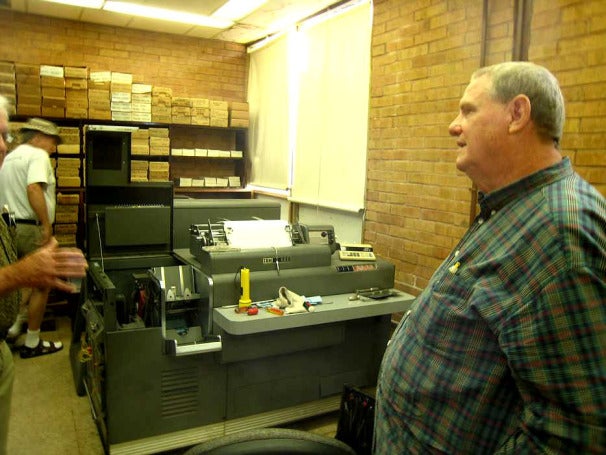Originally posted by jacob
View Post
Announcement
Collapse
No announcement yet.
Intel Itanium IA-64 Support To Be Deprecated By GCC 10, Planned Removal In GCC 11
Collapse
X
-
I guess we could say iAPX 432 was too CISCy, while IA-64 was too RISCy. History shows that the sweet spot lies somewhere between the two philosophies.
- Likes 1
-
Lest we forget iAPX 432… 😏Originally posted by jacob View PostThe Itanic will be remembered as one of the worst ideas in CPU design history, with a botched implementation to match.
- Likes 2
Leave a comment:
-
The Itanic will be remembered as one of the worst ideas in CPU design history, with a botched implementation to match.
Leave a comment:
-
even then, the older the system, the less likely it is to fail, we've still got a HP 1000 chugging along here. :^)Originally posted by stormcrow View Post
In ten years you'll still have those containers running on whatever hardware they moved it to, probably with only difference is whatever they've replaced failed hardware in that intervening period. It's also just as likely those old Itanium servers will still be in use because no one in management wants to either spend money on migration, or none of the IT support staff want to wake the sleeping giant of problems trying to replace legacy hardware can cause. Like the IRS is still using decades old IBM mainframes, and companies still using old punch card calculator systems. If it's not broke, don't run the risk of "fixing it" and having a technical catastrophe (failed/inept migration) and/or political nightmare on your head (raising taxes to pay for it and/or major budget increases to management-voters-shareholders).
 The application programming languages undergirding some federal IT systems were new when "The Andy Griffith Show" premiered.
The application programming languages undergirding some federal IT systems were new when "The Andy Griffith Show" premiered.
 From 1970s minicomputers used for military programs (including nuclear weapons) to an IBM punch-card system still keeping the books at a Texas filter supplier, these are the computers that time forgot.
From 1970s minicomputers used for military programs (including nuclear weapons) to an IBM punch-card system still keeping the books at a Texas filter supplier, these are the computers that time forgot.
If these aren't public facing systems, there's usually not any real risk to leaving them alone other than hardware failure.
Leave a comment:
-
Now where is the smiley for the Ironic Captain Obivous...?Originally posted by Kemosabe View Post
Right ...

Leave a comment:
-
In ten years you'll still have those containers running on whatever hardware they moved it to, probably with only difference is whatever they've replaced failed hardware in that intervening period. It's also just as likely those old Itanium servers will still be in use because no one in management wants to either spend money on migration, or none of the IT support staff want to wake the sleeping giant of problems trying to replace legacy hardware can cause. Like the IRS is still using decades old IBM mainframes, and companies still using old punch card calculator systems. If it's not broke, don't run the risk of "fixing it" and having a technical catastrophe (failed/inept migration) and/or political nightmare on your head (raising taxes to pay for it and/or major budget increases to management-voters-shareholders).Originally posted by Drizzt321 View Post
Build fresh replacements when an existing container runs just fine on whatever hardware? Are you kidding me? Pffff No, they'll just keep using the Intel compiler for years to come. Maybe in 10 years they'll embark on an effort to modernize, we'll see.
 The application programming languages undergirding some federal IT systems were new when "The Andy Griffith Show" premiered.
The application programming languages undergirding some federal IT systems were new when "The Andy Griffith Show" premiered.
 From 1970s minicomputers used for military programs (including nuclear weapons) to an IBM punch-card system still keeping the books at a Texas filter supplier, these are the computers that time forgot.
From 1970s minicomputers used for military programs (including nuclear weapons) to an IBM punch-card system still keeping the books at a Texas filter supplier, these are the computers that time forgot.
If these aren't public facing systems, there's usually not any real risk to leaving them alone other than hardware failure.
- Likes 1
Leave a comment:
-
Build fresh replacements when an existing container runs just fine on whatever hardware? Are you kidding me? Pffff No, they'll just keep using the Intel compiler for years to come. Maybe in 10 years they'll embark on an effort to modernize, we'll see.Originally posted by edwaleni View PostMost customers are moving legacy apps on HP-UX IA-64 to containers. Then they can let the clock run out on the hardware as HP allows. This gives them time to develop the replacements on the platform of their choice. Eazy-peasy.
- Likes 2
Leave a comment:

Leave a comment: